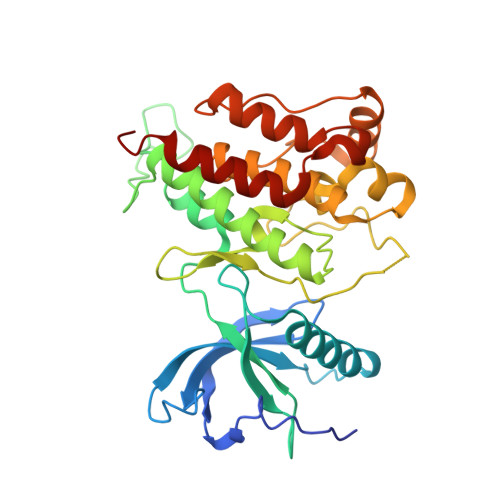H3B-6527 Is a Potent and Selective Inhibitor of FGFR4 in FGF19-Driven Hepatocellular Carcinoma.
Joshi, J.J., Coffey, H., Corcoran, E., Tsai, J., Huang, C.L., Ichikawa, K., Prajapati, S., Hao, M.H., Bailey, S., Wu, J., Rimkunas, V., Karr, C., Subramanian, V., Kumar, P., MacKenzie, C., Hurley, R., Satoh, T., Yu, K., Park, E., Rioux, N., Kim, A., Lai, W.G., Yu, L., Zhu, P., Buonamici, S., Larsen, N., Fekkes, P., Wang, J., Warmuth, M., Reynolds, D.J., Smith, P.G., Selvaraj, A.(2017) Cancer Res 77: 6999-7013
- PubMed: 29247039
- DOI: https://doi.org/10.1158/0008-5472.CAN-17-1865
- Primary Citation of Related Structures:
5VND - PubMed Abstract:
Activation of the fibroblast growth factor receptor FGFR4 by FGF19 drives hepatocellular carcinoma (HCC), a disease with few, if any, effective treatment options. While a number of pan-FGFR inhibitors are being clinically evaluated, their application to FGF19-driven HCC may be limited by dose-limiting toxicities mediated by FGFR1-3 receptors. To evade the potential limitations of pan-FGFR inhibitors, we generated H3B-6527, a highly selective covalent FGFR4 inhibitor, through structure-guided drug design. Studies in a panel of 40 HCC cell lines and 30 HCC PDX models showed that FGF19 expression is a predictive biomarker for H3B-6527 response. Moreover, coadministration of the CDK4/6 inhibitor palbociclib in combination with H3B-6527 could effectively trigger tumor regression in a xenograft model of HCC. Overall, our results offer preclinical proof of concept for H3B-6527 as a candidate therapeutic agent for HCC cases that exhibit increased expression of FGF19. Cancer Res; 77(24); 6999-7013. ©2017 AACR .
Organizational Affiliation:
H3 Biomedicine, Cambridge, Massachusetts.

















